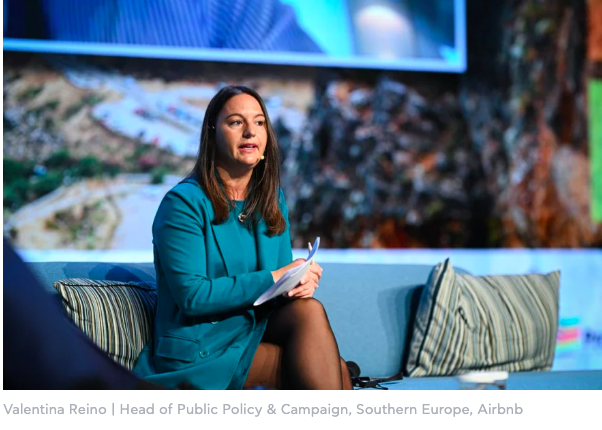In recent years, tax revenues from short-term rentals in Greece have surged dramatically. Tax earnings from Airbnb-style rentals have increased more than tenfold since 2017, according to Giorgos Pitilís, head of the Independent Authority for Public Revenue (AADE). Pitilis announced the 25th Prodexpo, the longest-running real estate conference in Greece, held on October 21-22, 2024, at the Athens Concert Hall.
“In 2017, tax revenues from short-term rentals were approximately €70 million, while last year, they reached €740 million. This year, we have already collected €742 million in the first nine months (compared to €640 million during the same period in 2023), and we estimate that the total will reach €830 million by the end of the year,” Pitilis revealed. He emphasized that AADE, in collaboration with short-term rental platforms, has developed tools to provide high-quality market data. According to this data, 6,200 legal entities have declared more than three properties, with compliance at a good level—90% of operators have opened tax books, though around 500 have entered incorrect codes, and another 500 have taken no action at all. “We’ve identified them and will follow up to ensure they comply,” Pitilís added, noting that only 12% of listings remain problematic.

When asked about vacant properties by moderator Stelios Kraloglou, a journalist from Proto Thema, Pitilís explained that the exact number is currently unknown, but this will change by 2025 when a property management registry is launched in cooperation with the Hellenic Cadastre.
From his side, Alexis Patelis, the Prime Minister’s Economic Advisor, shared additional data on short-term rentals. He explained that 100,000 properties in Greece now have unique Property Registration Numbers (AMAs) for short-term rental purposes, with 40,000 AMAs added in the last four years. “Of those 100,000 AMAs, a quarter are rented for more than 90 days annually, which is why we decided against imposing a time limit on rentals,” Patelis stated. He further explained that 80,000 of these properties are owned by individuals, 80% of which are rented for fewer than 90 days. Meanwhile, 20,000 properties are owned by legal entities, half of which exceed the 90-day rental mark. “This is why stricter regulations have been applied to legal entities,” Patelis added.

The average annual income per AMA is around €7,350, according to Patelis. Regarding the new restrictions on short-term rentals in three Athens districts, he noted that in some central neighborhoods, short-term rentals exceed 5% of available housing, leading to concerns about social fabric disruption. “This measure will be implemented in early 2025, and by the end of the year, we will assess whether it should be extended,” Patelis remarked.
Patelis also highlighted the government’s commitment to creating better databases and ensuring greater transparency in the real estate market, noting that a wealth of information across different services must be consolidated. He pointed out that many areas of the country have not benefited equally from tourism growth, contributing to regional disparities, while he called the transition to climate-friendly buildings and energy upgrades a critical issue.

Valentina Reino, Head of Public Policy for Southern Europe at Airbnb, praised Greece’s collaboration with AADE, calling it a best practice in Europe. Reino emphasized how easy it is for hosts to register on Airbnb and comply with the law, with the process being automated and recurring annually. She also stated that in countries where rental restrictions were imposed, local communities saw no real benefit, and housing prices increased. She added, “In most areas, Airbnb has little to no impact on housing availability or pricing.”

In a panel discussion, Stratos Paradias, President of the Hellenic Property Federation (POMIDA) and the International Union of Property Owners (UIPI) expressed concerns about potential overregulation of short-term rentals and so-called “over-tourism.” He argued that short-term rentals have revitalized many Athenian neighborhoods and warned that the proposed cap on three properties in the city center could create significant issues for landlords.

Regarding the government’s proposed three-year tax exemption for bringing vacant properties back to the market, Paradias supported the initiative but cautioned against unnecessary restrictions. He emphasized that overregulation could reduce housing availability for younger generations.
Ask me anything
Explore related questions





